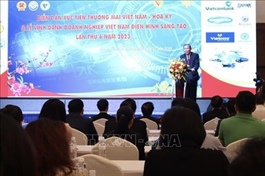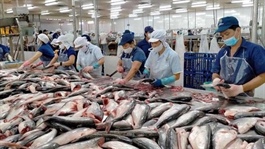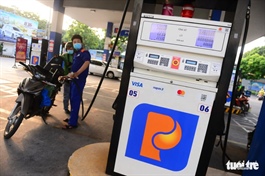Vietnamese food delivery market not so sweet
Vietnamese food delivery market not so sweet
The market of Vietnamese food delivery through apps has grown strongly in the past few years, especially during the COVID-19 pandemic. This is considered a delicious piece of cake for service providers, but it is not easy to enjoy.

Baemin stopped operating in Việt Nam from December 8, which came as a surprise to many people. — Photo nhipcaudautu.vn |
Over the past four years, Baemin has become a large, famous delivery brand, creating good brand recognition in the Vietnamese market after aggressive and methodical marketing campaigns.
Therefore, the fact that Baemin stopped operating in Việt Nam from December 8 came as a surprise to many people.
Baemin is operated by Woowa Brothers Việt Nam, a joint venture between Woowa Brothers – the leading food delivery company in South Korea, and Delivery Hero – a German food delivery technology group, operating in more than 50 countries.
Baemin decided to leave Việt Nam because of the difficult economic situation globally, as well as the fierce competition in the country.
Commenting on Baemin's departure, marketing experts said that this foreign soldier had created a good brand, attracting attention from users, but did not create a difference in products and services.
Baemin's departure from Việt Nam has partly shown that the food delivery market is fiercely competitive.
Results of the "Connected Consumer" report for the third quarter of this year published by Decision Lab and the Việt Nam Mobile Marketing Association showed that the demand for ordering food online has increased sharply and delivery platforms are competing fiercely to dominate the market.
GrabFood is the most used food delivery application with a rate of 49 per cent, followed by ShopeeFood with a rate of 45 per cent.
Fierce competitive pressure
After Baemin left the market, many people began to worry about Vietnamese food delivery brands such as Loship and BeFood.
Experts estimate that each of these brands currently accounts for only a few per cent of the market share.
To attract store partners to participate in selling on Loship, this brand has offered programmes such as free shipping for stores.
The reason why Loship has survived until now is because it raised US$12 million in capital by venture capital fund BAce Capital, sponsored by Ant Group and Sun Hung Kai & Co. – a listed investment company in Hong Kong.
Providing information to the press earlier this year, Nguyễn Hoàng Trung, CEO of Loship, said that the company recorded a 500 per cent increase in revenue last year compared to 2021 thanks to optimising business operations with 250,000 stores and more than five million users.
Loship also focuses on cutting losses and promoting profitability in 12 operating cities. It is expected to reach the profitable milestone this year.
Food delivery and supermarket shopping would still have big competition in the next three years, said Trung.
In addition, food delivery applications will also deploy additional services related to financial technology such as their own e-wallets to exploit the available user base.
Loship had no plans to enter the financial technology sector to 'burn money', said Trung, instead, the business wanted to exploit the number of restaurant partners to supply raw materials.
Besides Loship, there is another Vietnamese delivery brand on the market, beFood. To stay in the market, beFood has also launched programmes to attract customers such as reducing surcharges for small orders and becoming the platform with the lowest small order delivery surcharges in the market.
The removal of small order surcharges aims to encourage individual customers to order low-value items anytime, anywhere, said a beGroup representative to Kinh tế Sài Gòn (Saigon Times) online newspaper.
Eliminating small order surcharges also promises to bring more potential online business opportunities to local eateries.
Be believes that this policy can help them reach up to seven million active users on the platform and be more considered by customers even when eating alone.
After Beamin's departure, experts said that they did not know how long Vietnamese food delivery brands could stay in the market, especially in the difficult economic context after the COVID-19 pandemic when many people were tightening their spending.
Besides, customers often look for applications with strong incentives and discounts. The food delivery market is still a game of 'burning money' to retain and attract customers.





















